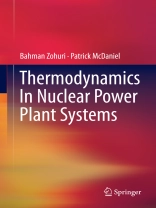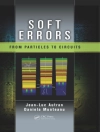This book covers the fundamentals of thermodynamics required to understand electrical power generation systems, honing in on the application of these principles to nuclear reactor power
systems. It includes all the necessary information regarding the fundamental laws to gain a complete understanding and apply them specifically to the challenges of operating nuclear plants. Beginning with definitions of thermodynamic variables such as temperature, pressure and specific volume, the book then explains the laws in detail, focusing on pivotal concepts such as enthalpy and entropy, irreversibility, availability, and Maxwell relations. Specific applications of the fundamentals to Brayton and Rankine cycles for power generation are considered in-depth, in support of the book’s core goal- providing an examination of how the thermodynamic principles are applied to the design, operation and safety analysis of current and projected reactor systems. Detailed appendices cover metric and English system units and conversions, detailed steam and gas tables, heat transfer properties, and nuclear reactor system descriptions.
İçerik tablosu
Definitions and Basic Principles.- Properties of Pure Substances.- Mixture.- Work and Heat.- First Law of Thermodynamics.- The Kinetic Theory of Gases.- Second Law of Thermodynamics.- Reversible Work, Irreversibility, and Exergy (Availability).- Gas Kinetic Theory of Entropy.- Thermodynamic Relations.- Combustion.- Heat Transfer.- Heat Exchangers.- Gas Power Cycles.- Vapor Power Cycles.- Circulating Water Systems.- Electrical System.- Nuclear Power Plants.- Nuclear Fuel Cycle.- The Economic Future of Nuclear Power.- Safety, Waste Disposal, Containment, and Accidents.
Yazar hakkında
Dr. Bahman Zohuri is founder of Galaxy Advanced Engineering, Inc. a consulting company that he formed upon leaving the semiconductor and defense industries after many years as a Senior Process Engineer for corporations including Westinghouse and Intel, and then as Senior Chief Scientist at Lockheed Missile and Aerospace Corporation . During his time with Westinghouse Electric Corporation, he performed thermal hydraulic analysis and natural circulation for Inherent Shutdown Heat Removal System (ISHRS) in the core of a Liquid Metal Fast Breeder Reactor (LMFBR). While at Lockheed, he was responsible for the study of vulnerability, survivability and component radiation and laser hardening for Defense Support Program (DSP), Boost Surveillance and Tracking Satellites (BSTS) and Space Surveillance and Tracking Satellites (SSTS). He also performed analysis of characteristics of laser beam and nuclear radiation interaction with materials, Transient Radiation Effects in Electronics (TREE), Electromagnetic Pulse (EMP), System Generated Electromagnetic Pulse (SGEMP), Single-Event Upset (SEU), Blast and, Thermo-mechanical, hardness assurance, maintenance, and device technology. His consultancy clients have included Sandia National Laboratories, and he holds patents in areas such as the design of diffusion furnaces, and Laser Activated Radioactive Decay. He is the author of several books on heat transfer and directed energy weapons technologies.
Dr. Patrick Mc Daniel is currently Adjunct and Research Professor in the Department of Chemical and Nuclear Engineering at the University of New Mexico. Dr. Mc Daniel began his career as a pilot and maintenance officer in the United States Air Force. He went on to work at Sandia National Laboratories in fast reactor safety, integral cross section measurements, nuclear weapons vulnerability, space nuclear power, and nuclear propulsion. He left Sandia to become the technical leader for the Phillips Laboratory Satellite Assessment Center for a decade, then returned to Sandia to lead DARPA’s Stimulated Isomer Energy Release project. While at Sandia, he worked on the Yucca Mountain Project and DARPA’s classified UER-X program. He has taught in the University of New Mexico’s Nuclear Engineering program for 25 years, and has worked on many classified and unclassified projects in the application of nuclear engineering to high energy systems. Dr. Mc Daniel holds a Ph.D. in Nuclear Engineering from Purdue University.












